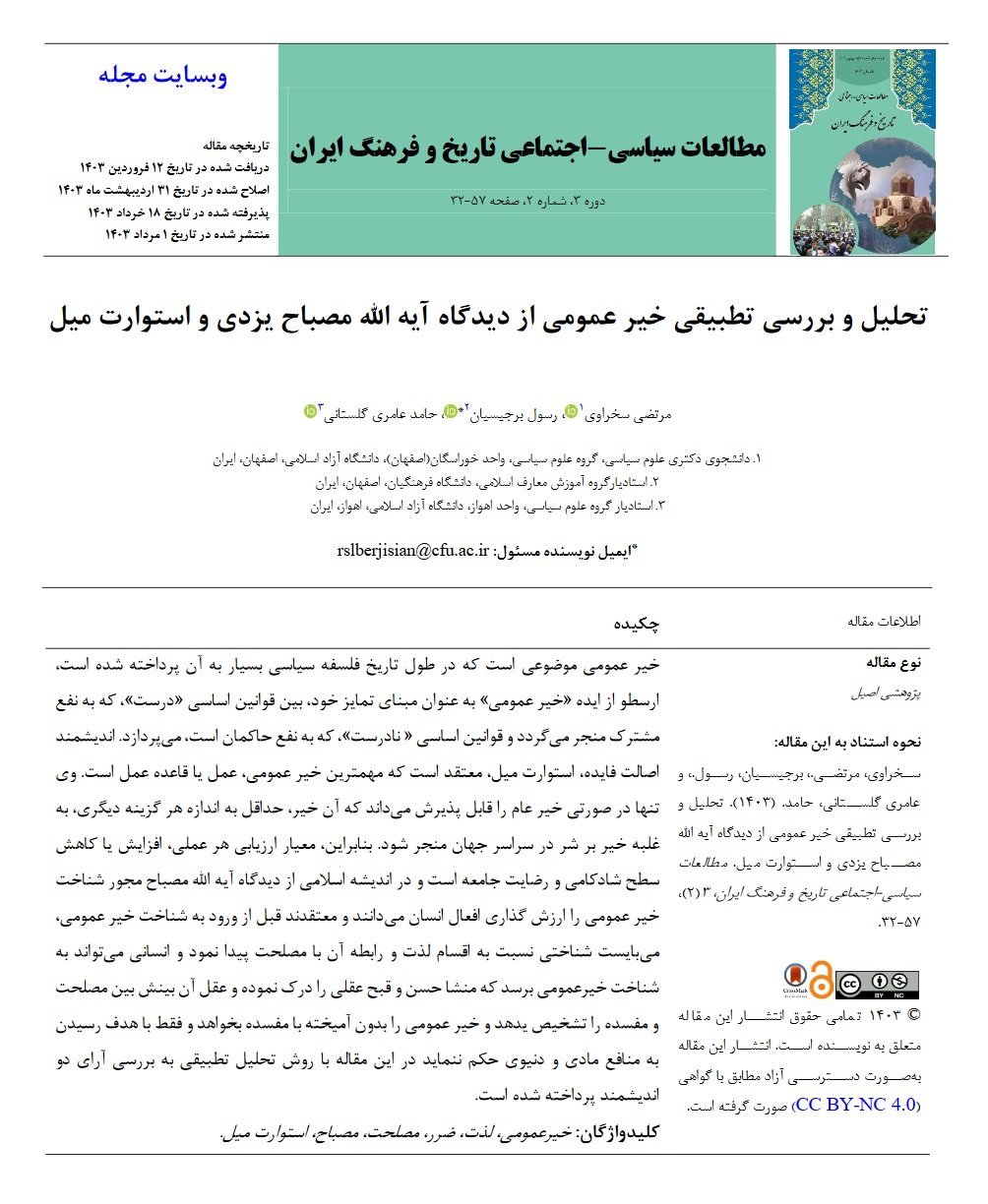Comparative Analysis of Public Good from the Perspective of Ayatollah Mesbah Yazdi and Stuart Mill
Keywords:
public good, pleasure, harm, interest, Mesbah, Stuart MillAbstract
The public good is a topic that has been extensively addressed throughout the history of political philosophy. Aristotle uses the idea of the "public good" as the basis for his distinction between "right" constitutions, which lead to the common benefit, and "wrong" constitutions, which benefit the rulers. The utilitarian thinker, Stuart Mill, believes that the most important public good is the act or rule of action. He considers the public good acceptable only if it leads to the dominance of good over evil in the world at least as much as any other option. Therefore, the criterion for evaluating any action is the increase or decrease in the level of happiness and satisfaction of society. In Islamic thought, from the perspective of Ayatollah Mesbah Yazdi, the key to understanding the public good is the evaluation of human actions. He believes that before understanding the public good, one must have an understanding of the types of pleasure and their relationship to interests. A person can reach an understanding of the public good if they comprehend the source of moral goodness and badness and if their intellect can discern the difference between benefit and harm, seeking the public good without mixing it with harm and not merely judging with the aim of achieving material and worldly benefits. This article uses a comparative analytical method to examine the views of these two thinkers.
Downloads
References
Alidoost, A. (2020). Jurisprudence and expediency, publishing organization of Islamic Culture and Thought Research Institute. In.
Alidoost, A. (2021). Jurisprudence and expediency, published by the Research Institute of Islamic Culture and Thought. In.
Dehkhoda, A. A. (1999). Dictionary, Publishing and Printing Institute of Tehran University. In.
Egburn. (1979). William Fielding and other fields of sociology, translated by Amir Hossein Arianpour. Pocket Books.
Ermson, J. E. (2002). Interpretation of John Stuart Mill's Moral Philosophy". Compiled by Philippa Foote. Theories of moral philosophy (H. Kaji, Trans.). Rozeneh.
Finnis, A. (2011). The Limits of Privacy. Basic Books, Finnis.
Ghazali, A. H. (1427). Revival of Ulum al-Din, 4 volumes, suspended by Muhammad Wahbi Suleiman and Osama Amourah. Dar al-Fikr.
Makram, M. I. (2000). Ibn Manzoor. Lasan al-Arab, 2.
McIntyre, A. (2016). History of Moral Philosophy (G. willing, Trans.). Hekmat Publishing House.
Misbah Yazdi, M. T. (2008). Mullah's Message of Martyrdom (M. M. N. Qomi, Ed.). Publications of Imam Khomeini Educational and Research Institute.
Misbah Yazdi, M. T. (2011). Mashkat: Teaching Philosophy (Vol. 1). Imam Khomeini Educational and Research Institute.
Misbah Yazdi, M. T. (2013). Mashkat (K. Sobhani, Ed.). Imam Khomeini Educational and Research Institute Publications.
Misbah Yazdi, M. T. (2013). Research and writing: Gholamreza Motaghifar. Publications of Imam Khomeini Educational and Research Institute (Quds Sareh.
Misbah Yazdi, M. T. (2014). Mohammad Taqi, review of moral schools, Imam Khomeini Educational and Research Institute (RA. Ch, 1.
Misbah Yazdi, M. T. (2022). the topic of pleasure and perfection, information base In.
Mohsenian Rad, M. (2012). Revolution of Press and Values. Tehran Center for Media Studies and Research.
Moin, M. (1983). Farhang Moin. Amir Kabir Publications.
Mortazavian, A. (2012). Rousseau and general critical crisis; Everyone's will, public will and public good, . Surah Andisheh magazine.
Reisch, M. (2018). For the Common Good Essays of Harold Lewis. Brunner-Routledge New York and Hove.
Riordan, P. (1996). The Politics of the Common Good. Institute of Public Administration.
Shaban Nia, Q., & Ghorbani, M. (2012). Efficiency of the Velayat al-Faqih theory regarding public interest". Islamic Government(year, No. 67).
Stanford, E. o. P. (2017). by the publish The Metaphysics Research Lab. In.
Yuengert, A. (2009). The Common Good for Economists. Faith and Economics, 38, 1–9.
Zarqa, M., A. (2010). Distinguishing Normative Proof and Methodology of Islamic Economics Author: Ayouz Lo H and Hosseini S. A. Economics of Islamic Philosophy, Imam Sadegh University Press.








